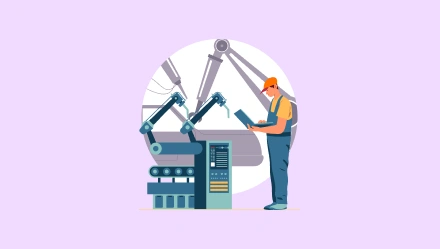Industries and Applications of Industrial Automation
Industrial automation finds widespread application across various industries, revolutionizing processes, and increasing efficiency. Let's explore some key industries where industrial automation plays a significant role:
- Manufacturing and production: In the manufacturing sector, industrial automation optimizes production processes, enhances productivity, and ensures consistent product quality. Automation technologies such as robotic arms, conveyor systems, and programmable logic controllers streamline operations, reduce manual labor, and enable seamless integration between machines and systems.
- Energy and utilities: Industrial automation is crucial in the energy and utilities industry for monitoring and controlling power generation, transmission, and distribution systems. Automation enables efficient energy management, real-time monitoring of equipment performance, and predictive maintenance. Smart grid technologies, SCADA systems, and remote monitoring are examples of automation applications in this sector.
- Automotive and aerospace: The automotive and aerospace industries rely heavily on industrial automation to achieve precision, speed, and accuracy in manufacturing processes. Automation technologies are used for assembly line operations, quality control, robotic welding, material handling, and inspection. Automation ensures consistent production standards and compliance with stringent safety regulations.
- Pharmaceutical and healthcare: Industrial automation plays a vital role in pharmaceutical manufacturing and healthcare facilities. Automation systems are used for precise dosing and mixing of pharmaceutical ingredients, packaging, labeling, and quality control. In healthcare, automation improves patient care through robotic surgery, automated drug dispensing systems, and laboratory automation for efficient sample processing.
- Food and beverage: The F&B industry utilizes industrial automation to ensure consistency in production, enhanced food safety, and increased throughput. Automated systems control processes such as ingredient handling, mixing, filling, and packaging. Industrial robots assist in tasks like picking and placing, sorting, and palletizing, enabling high-speed and accurate operations.
Career Path and Growth Opportunities for Industrial Automation Technicians
Industrial automation offers a promising career path with ample opportunities for growth and advancement. Let's understand the various aspects of career progression for industrial automation technicians:
Entry-level positions and career progression: Entry-level positions for industrial automation technicians often include roles such as automation technician, control system technician, or maintenance technician. In these roles, technicians gain hands-on experience working with automation systems, troubleshooting issues, and ensuring smooth operations. With experience, technicians can progress to senior positions and take on more responsibilities.
- Specializations and advanced roles: As industrial automation technicians gain expertise, they can choose to specialize in specific areas such as PLC programming, robotics, process automation, or SCADA systems. Specializations, especially in Mechatronics, open up opportunities for advanced roles like automation engineer, systems integrator, or project manager. These roles involve designing and implementing complex automation systems, overseeing projects, and ensuring efficient operations.
- Opportunities for leadership and management: With experience and a strong track record, industrial automation technicians can move into leadership and management positions. They can become automation team leaders, supervise mechanics and technicians, or take on managerial roles where they oversee automation projects, coordinate with cross-functional teams, and make strategic decisions to drive organizational success.
- Entrepreneurship and consulting: Industrial automation technicians who possess extensive knowledge and experience can explore entrepreneurial ventures or consulting opportunities. They can establish their own automation consulting firms to offer specialized services to industries in need of automation solutions. Additionally, they can provide consultancy services on automation implementation, system optimization, and process improvement, leveraging their expertise to assist organizations in achieving their automation goals.
The Future of Industrial Automation and the Role of Technicians
As the field of industrial automation continues to evolve, technicians must stay abreast of emerging trends, technologies, and industry transformations. Let’s figure out the future of industrial automation and the vital role technicians play:
Emerging Trends and Technologies
Industrial automation is witnessing the emergence of several key trends and technologies that shape its future. These include the Internet of Things (IoT), artificial intelligence (AI), machine learning (ML), big data analytics, and advanced robotics. Technicians need to stay informed about these advancements and understand how they can be applied to optimize automation systems and processes.
Impact of Industry 4.0 and Digital Transformation
Industry 4.0, characterized by the integration of digital technologies with traditional manufacturing processes, is revolutionizing industrial automation. Technicians play a crucial role in implementing and managing this digital transformation. They need to adapt to new technologies, such as cloud computing, cyber-physical systems, and data-driven decision-making to ensure efficient and interconnected automation systems.
Importance of Continuous Learning and Staying Updated
Continuous learning is vital in the rapidly evolving field of industrial automation. Technicians must actively seek out opportunities for professional development, such as attending industry conferences, workshops, and training programs. They must stay updated with the latest advancements, best practices, and regulatory standards in automation. Embracing lifelong learning enables technicians to remain at the forefront of the industry and seize new opportunities.
Embracing Automation: Empowering Technicians for the Future
The demand for skilled industrial automation technicians is expected to keep growing as industries continue to adopt automation at an unprecedented pace. This presents a promising future for those entering or already working in this field. With opportunities for career progression, specialization, leadership, and even entrepreneurship, industrial automation offers a rewarding and fulfilling career path with competitive pay and benefits.
If you have a passion for technology, problem-solving, and contributing to the advancement of industries, pursuing a career as an industrial automation technician can be a transformative choice.
Unleash Your Potential in Industrial Automation with Unmudl
Ready to take your career in industrial automation to the next level? Unmudl offers an exciting range of courses in mechatronics, designed to equip you with the skills needed for success in this rapidly growing field.
Explore Unmudl's specialized certificate programs and online courses that cover key aspects of mechatronics, including Introduction to Mechatronics, Mechatronics for Equipment Maintenance, and Principles of Control Systems. These courses are designed to provide you with the practical knowledge and hands-on training essential for the job.
Take the next step in your industrial automation journey and join forces with Unmudl. Sign up today to unlock a rewarding career in industrial automation!


.webp)


















.webp)



